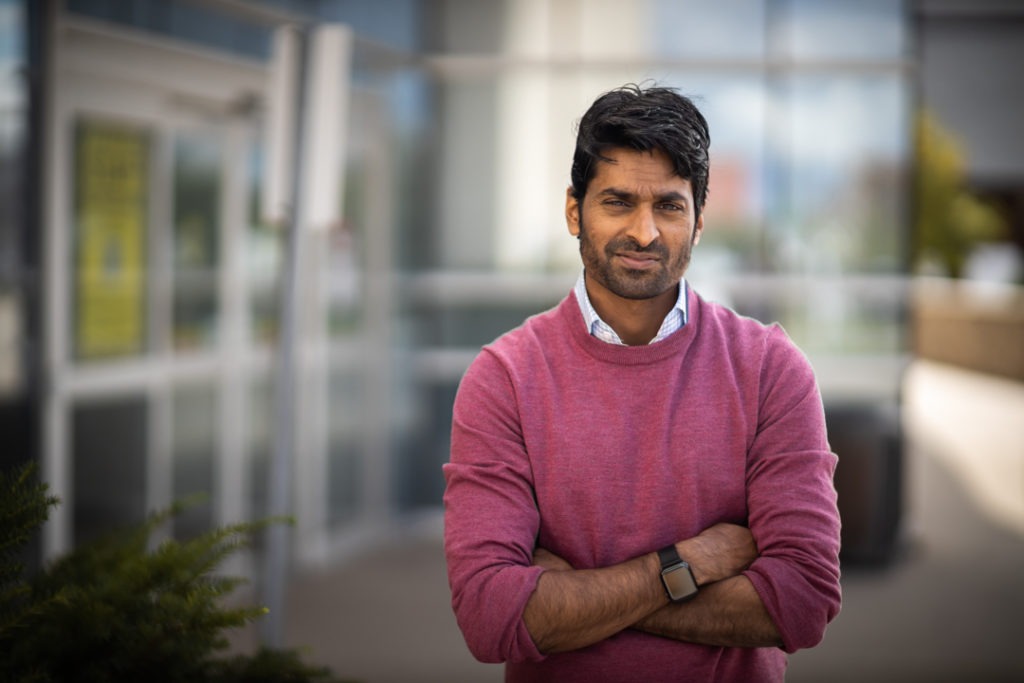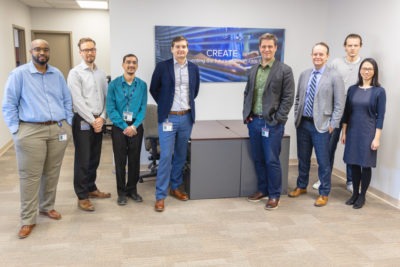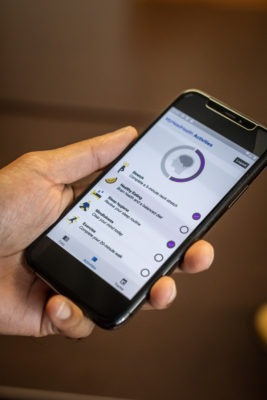
Chronic concussion? There’s an app for that
An innovative new app being developed at Hamilton Health Sciences could revolutionize care for people with chronic concussion symptoms.
The MyHeadHealth mobile app is the brainchild of Dr. Gihan Perera, a physical medicine and rehabilitation specialist who works at the Hamilton Health Sciences (HHS) Regional Rehabilitation Centre at Hamilton General Hospital. The rehabilitation centre provides specialized care to patients recovering from a variety of conditions including traumatic brain injuries.
Perera is developing the app in partnership with HHS’ CREATE (CentRE for dAta science and digiTal hEalth). While Perera had a winning idea, he needed CREATE’s technical expertise to fully realize his vision. So he teamed up with CREATE’s digital data and tech experts.
The app is in the final stages of development and will be ready for patient use early next year.
Brainstorming with CREATE
“We’re developing a concussion app that’s built into the healthcare system. That’s what really sets it apart.”
“We know that there are clinician innovators like Dr. Perera with really great ideas about innovative new ways to deliver health care, but they don’t necessarily have the technical expertise to realize their vision,” says Dr. Jeremy Petch, CREATE’s director. “That’s where CREATE comes in. We’re developing a concussion app that’s built into the healthcare system. That’s what really sets it apart.”

The CREATE team: Mo Ibrahim, Joel Kemppainen, Nityan Khanna, Peter Sztur, Jeremy Petch, Ted Scott, Walter Nelson and Shuang Di. (From HHS Files)
Staffed with experts in software engineering, artificial intelligence and data sciences, CREATE works with hospital physicians to develop new ideas and create digital solutions. The end results are polished software products that can be used in a clinical setting. With this project, CREATE provided the software and app development expertise, and is ensuring that it meets stringent security and privacy requirements.
“Connecting with CREATE was the turning point for the development of this app,” says Perera. “They immediately understood the medical and research implications of this project.”
Managing chronic symptoms
Concussion symptoms can include headaches, dizziness, difficulty concentrating, vision problems, trouble sleeping, mood swings and anxiety. When symptoms last longer than three months, they’re considered chronic. About 15 per cent of people diagnosed with a concussion experience chronic symptoms.
The Integrated Adult Concussion Clinic (IACC) at the Regional Rehabilitation Centre provides these patients with an initial consultation where they receive an assessment and treatment plan that encourages healthy lifestyle habits like daily exercise, stretching, meditation, good nutrition and getting enough sleep to help manage symptoms. Patients are also asked to take note of any changes in their symptoms, and share these changes with their physician at follow-up appointments.
While patients need to be in the driver’s seat for their recovery process, Perera noticed that many struggled to maintain their daily regimen and provide their doctor with detailed updates.
The MyHeadHealth app will support patients in their day-to-day recovery through a customized care plan provided by their specialist that includes instructional videos for exercises, stretching and meditation.
Tracking daily routines
There’s a daily tracker so patients can record their activities, nutrition and sleep habits.

Patients will be able to track activities, nutrition, sleep habits and symptoms using the MyHeadHealth app.
“Exercise and healthy lifestyle habits have this amazing ability to allow new neurons to grow, and this increases concentration and cognition,” says Perera.
“The MyHeadHealth app is an excellent example of how HHS is transforming healthcare through innovation and collaboration.”
A symptom tracker allows patients to monitor their symptoms on a daily basis. These trackers give physicians much more detailed information about the patient’s ability to follow their daily care routine, and their recovery process. The app also holds great promise as a research tool, since data collected could help unlock new information about chronic concussions and how best to treat them.
Celebrating innovation for HHS Research Awareness Month
“The MyHeadHealth app is an excellent example of how HHS is transforming healthcare through innovation and collaboration,” says Dr. Ted Scott, the hospital’s vice-president of research and chief innovation officer.
“October is HHS Research Awareness Month and I’m pleased to see this success story shared as an example of the exciting research underway at HHS,” says Scott. “Our research is helping to revolutionize the way healthcare is provided by creating a more patient-centred and seamless health care system.”
The roll-out
The Regional Rehabilitation Centre will begin testing the app in January with a small number of patients. It will roll out as a minimum viable product – meaning it will offer basic features for patients to test drive and provide feedback. Perera and CREATE will build on this feedback, adding more features for patients to try out over several months. This test period is expected to take about one year.
“Our goal is for MyHeadHealth to be the international standard of care for chronic concussion rehabilitation.”
Petch sees potential for future expansion as well.
“HHS is our test base, but we plan to scale this out to other healthcare systems,” he says, adding that CREATE has written the privacy policies and security measures with an international market in mind.
“Our goal is for MyHeadHealth to be the international standard of care for chronic concussion rehabilitation, so that patients around the world can benefit from the leading-edge research and innovation happening here at HHS.”
Related:
Understanding breast cancer through AI
